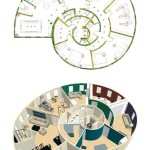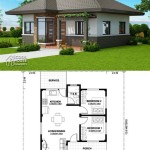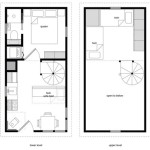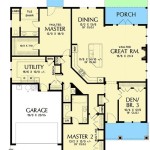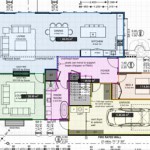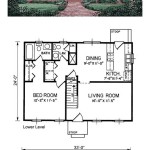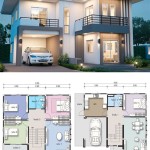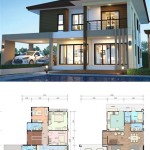Daylight Basement House Plans: A Comprehensive Guide
Daylight basement house plans offer a unique blend of functionality and value, providing additional living space while capitalizing on natural light. Unlike traditional basements, daylight basements, also known as walk-out basements, feature one or more walls that are fully or partially above ground, allowing for windows and doors. This design transforms what would otherwise be a dark, potentially damp area into a bright, inviting extension of the living space. This guide explores the advantages, key considerations, and design aspects of daylight basement house plans, offering insights for homeowners considering this type of construction.
The Advantages of Daylight Basements
Daylight basements present a range of benefits that significantly enhance the value and usability of a home. The most prominent advantage is the introduction of natural light. Unlike conventional basements, where artificial lighting is the primary source, daylight basements benefit from sunlight streaming through windows and doors. This creates a more pleasant and energy-efficient environment, reducing reliance on electric lighting and promoting a sense of well-being.
The accessibility is another significant advantage. Walk-out basements typically feature a door that leads directly to the outside, making it easier to move furniture, equipment, and other items in and out. This direct access also provides a convenient exit point in case of emergencies. Furthermore, the accessibility makes daylight basements ideal for creating separate living spaces, such as in-law suites or rental units, without compromising the privacy of the main house.
Increased property value is also a notable benefit. The finished square footage that a daylight basement adds to a home can substantially increase its market value. A well-designed daylight basement can serve as a family room, home office, gym, or additional bedrooms, providing versatile living options that appeal to a wide range of potential buyers. This versatility makes daylight basements a worthwhile investment for homeowners looking to enhance the long-term value of their property.
Improved ventilation and reduced moisture are further advantages. The presence of windows and doors in a daylight basement allows for better air circulation, which helps to reduce humidity and prevent the growth of mold and mildew. This is particularly important in areas with high humidity levels. Proper ventilation also helps to maintain a comfortable temperature in the basement, making it a more enjoyable space to spend time in.
Finally, the aesthetic appeal of a daylight basement should be considered. The incorporation of natural light and outdoor access can transform a once-dismal basement into a bright and inviting extension of the main living area. This enhanced aesthetic appeal can significantly improve the overall quality of life for the occupants of the home.
Key Considerations in Daylight Basement House Plans
Planning a daylight basement requires careful consideration of several factors to ensure its functionality, safety, and aesthetic appeal. The most crucial aspect is the site's topography. Daylight basements are best suited for properties with sloping terrain, as the slope allows for the creation of a wall that is partially or fully above ground. The degree of the slope will dictate the amount of natural light and access that can be incorporated into the basement design. A professional site survey is recommended to accurately assess the topography and determine the optimal placement of the house.
Local building codes and regulations are another critical consideration. Zoning laws may dictate specific requirements for basement construction, including ceiling height, egress windows, and fire safety measures. It is essential to consult with local building officials to ensure that the daylight basement plans comply with all applicable codes. Additionally, homeowners' associations may have restrictions on exterior features, such as the placement of doors and windows, so it is important to review these guidelines as well.
Drainage and waterproofing are crucial for preventing water damage in a daylight basement. Proper drainage systems, such as French drains and sump pumps, should be installed to divert water away from the foundation. Waterproofing the exterior walls of the basement is also essential to prevent moisture from seeping into the interior. A well-designed drainage and waterproofing system will help to maintain a dry and healthy living environment in the basement.
Energy efficiency is another important consideration. Insulating the walls and floors of the daylight basement can help to reduce energy consumption and maintain a comfortable temperature year-round. Windows and doors should be energy-efficient models that minimize heat loss in the winter and heat gain in the summer. Proper insulation and energy-efficient windows and doors will help to lower utility bills and create a more sustainable home.
Finally, the intended use of the daylight basement should be carefully considered during the planning phase. The layout and design of the basement should be tailored to its intended purpose, whether it will be used as a family room, home office, guest suite, or rental unit. Factors such as the placement of doors and windows, the location of plumbing and electrical fixtures, and the overall flow of the space should be carefully planned to create a functional and comfortable living environment.
Design Elements of Daylight Basements
The design of a daylight basement offers opportunities to create a unique and inviting living space that seamlessly integrates with the rest of the home. The placement and size of windows and doors are critical elements that will determine the amount of natural light and outdoor access in the basement. Larger windows and glass doors can maximize natural light and provide views of the surrounding landscape. The strategic placement of windows can also help to create a sense of openness and connection to the outdoors.
The interior layout of the daylight basement should be designed to maximize its functionality and comfort. Open floor plans can create a sense of spaciousness and allow for flexible use of the space. Dividing walls can be used to create separate rooms, such as bedrooms, bathrooms, and home offices, while still maintaining a sense of connection to the main living area. The layout should be carefully planned to accommodate furniture, equipment, and other items without feeling cramped or cluttered.
Finishing materials should be selected to create a bright, comfortable, and durable living environment. Light-colored paint and flooring can help to reflect natural light and make the space feel larger and more open. Moisture-resistant materials, such as ceramic tile and vinyl flooring, are recommended for areas that are prone to moisture. The choice of materials should also be consistent with the overall aesthetic of the home.
Lighting plays a crucial role in creating a comfortable and inviting atmosphere in a daylight basement. In addition to natural light from windows and doors, artificial lighting should be carefully planned to provide adequate illumination for various activities. Recessed lighting, pendant lights, and task lighting can be used to create different moods and highlight specific areas of the space. Dimmers can be used to adjust the lighting levels to suit different needs and preferences.
Finally, access to utilities should be planned during the design phase. Plumbing fixtures, such as sinks, toilets, and showers, will require access to water and sewer lines. Electrical outlets and wiring will be needed to power lighting, appliances, and electronic devices. The placement of these utilities should be carefully planned to minimize disruption to the overall layout and ensure that they are easily accessible for maintenance and repairs.
A well-designed daylight basement can transform a once-underutilized space into a valuable addition to the home, providing extra living area, natural light, and easy outdoor access. By carefully considering the topography, building codes, drainage, energy efficiency, and intended use of the space, homeowners can create a daylight basement that enhances the value and functionality of their property.

A Guide To Sloping Lot House Plans

House Plans With Basements Walkout Basement Daylight The Designers

Daylight Basement 5 Bedroom Country Style House Plan 6518

House Plans With Basements Walkout Basement Daylight The Designers

Daylight Basement Craftsman Seattle By Spokane House Plans Inc Houzz

Luxury Modern Farmhouse Style House Plan 7226 Millerville

Benefits Of House Plans With Walkout Daylight Basements

Small Craftsman Home With Walk Out Basement Google Search A Frame House Plans Ranch Style Mountain

Mountain Mid Century Cottage Bedroom Downstairs With Walk Out Basement Cathedral Ceiling 7342

Drive Under House Plans With Basement Garage The Designers
Related Posts

